人教版七年级英语下册Unit 12单元整体分析
七年级英语下册(人教版)Unit12第1课时(SectionA1a2c)说课稿
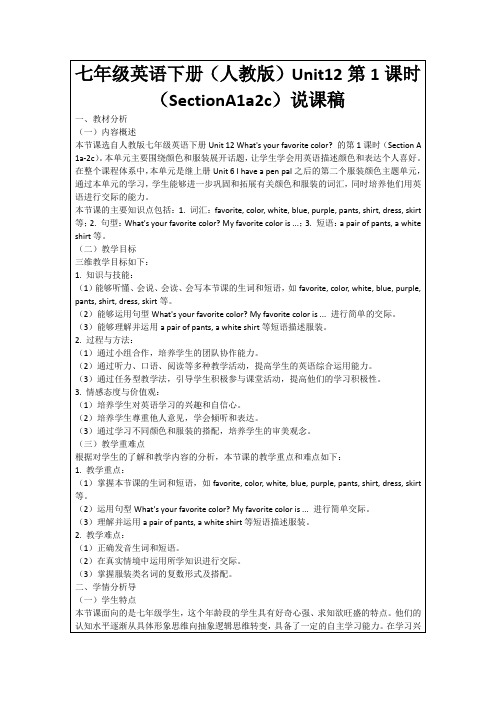
3.不断提高自身教学水平,学习新的教学理念和方法,以适应学生的需求。
(3)掌握服装类名词的复数形式及搭配。
二、学情分析导
(一)学生特点
本节课面向的是七年级学生,这个年龄段的学生具有好奇心强、求知欲旺盛的特点。他们的认知水平逐渐从具体形象思维向抽象逻辑思维转变,具备了一定的自主学习能力。在学习兴趣方面,学生对新鲜事物充满好奇,喜欢通过游戏、互动等形式学习英语。此外,学生在学习习惯上,已初步形成了合作、探究的学习方式,但仍有部分学生依赖性强,需要教师引导和督促。
(二)教学目标
三维教学目标如下:
1.知识与技能:
(1)能够听懂、会说、会读、会写本节课的生词和短语,如favorite, color, white, blue, purple, pants, shirt, dress, skirt等。
(2)能够运用句型What's your favorite color? My favorite color is ...进行简单的交际。
七年级英语下册(人教版)Unit12第1课时(SectionA1a2c)说课稿
一、教材分析
(一)内容概述
本节课选自人教版七年级英语下册Unit 12 What's your favorite color?的第1课时(Section A 1a-2c)。本单元主要围绕颜色和服装展开话题,让学生学会用英语描述颜色和表达个人喜好。在整个课程体系中,本单元是继上册Unit 6 I have a pen pal之后的第二个服装颜色主题单元,通过本单元的学习,学生能够进一步巩固和拓展有关颜色和服装的词汇,同时培养他们用英语进行交际的能力。
(三)பைடு நூலகம்动方式
七年级下册英语书第十二单元

七年级下册英语书第十二单元摘要:一、七年级下册英语书第十二单元概述1.单元主题2.单元目标3.单元内容结构二、单元主题解析1.主题内容2.主题意义三、单元目标详解1.语言知识目标2.语言技能目标3.学习策略目标4.情感态度目标四、单元内容结构详述1.课文2.词汇3.语法4.听说读写技能训练5.课外活动建议正文:一、七年级下册英语书第十二单元概述七年级下册英语书第十二单元的主题是“How can we help?”,旨在让学生学会如何表达帮助与被帮助的意愿,并了解不同的帮助方式。
通过本单元的学习,学生将掌握如何使用情态动词can来表示能力,如何用疑问词how 来提问,以及如何表达自己的需求和提供帮助。
二、单元主题解析本单元的主题为“How can we help?”,涉及到生活中我们如何帮助别人和寻求帮助的场景。
通过学习这个主题,学生可以更好地理解到帮助他人和接受帮助的重要性,培养乐于助人的品质。
三、单元目标详解1.语言知识目标:学生将学会使用情态动词can来表示能力,了解疑问词how的用法,以及掌握表示帮助与被帮助的常用短语和句型。
2.语言技能目标:学生能听懂、会说、会读、会写与本单元主题相关的英语句子,并能运用到实际生活中。
3.学习策略目标:学生能通过合作学习、自主学习和探究式学习等方式,积极参与课堂活动,提高学习效果。
4.情感态度目标:学生能理解帮助他人的意义,树立乐于助人的意识,形成积极向上的情感态度。
四、单元内容结构详述1.课文:通过一篇篇关于帮助与被帮助的故事,让学生在语境中学习如何表达帮助与被帮助的意愿,并了解不同的帮助方式。
2.词汇:提供与主题相关的词汇,如helpful, helpfulness, need, want等,帮助学生丰富词汇量。
3.语法:通过语法讲解和练习,让学生掌握情态动词can的用法和疑问词how的用法。
4.听说读写技能训练:通过听说读写等多种形式的练习,提高学生的语言运用能力。
人教版七年级英语下册Unit12_单元主题思维导图

How did Paul feel about his weekend?
Paul’s weekend
Lisa’s weekend
i_n_te_r_e_s_t_in__g
______
Scary
They put up (2)_t_e_n_ts_.
They made a fire and cooked food on.
_G_r_e_a_t____.
对话篇-SectionA 2d
_S_h_e_w__o_rk_e_d__a_s_a_g_u_i_d_e_a_t_t_h_e_N__a_tu_r_a_l___ _H_is_t_o_r_y_M__u_s_e_u_m_.__.
It was _f_u_n__.
They have a butterfly house with over_2_0_0_ kinds of butterflies!
否定句 疑问句
be型
主语+ was not(wasn't)/were not(weren't)+其他
如:They weren’t hard-working last year. 去年他们学习不努力。
do型 主语+ did not(didn't)+动词原形+其他
如:I did not (didn’t) call him last night. 我昨晚没有给他打电话。
be型
Was/Were+主语+其他?
如:Were they hard-working last year? 去年他们学习努力吗?
do型
Did+主语+动词原形+其他?
如:Did you call him last night? 你昨晚给他打电话了吗?
初中英语_Unit12 What did you do last weekend?教学设计学情分析教材分析课后反思

Unit12 What did you do last weekend?Section A (Grammar Focus-3c)一、教学目标:1. 语言知识目标:•To learn the new words: run away,mouse,baby,shout at,woof,language.•To review the simple past tense.•To know how to use who,what,when,where and how.2. 能力目标:1. To know how to talk about my last weekend in English.2. Improve the students’ listening , speaking and reading skills.3. 情感态度目标:Everyone should enjoy your life.二、教学重难点1. 教学重点:1) Key vocabulary, 特殊疑问句练习。
2) Talk about recent past events2. 教学难点:Talk about recent past eventsPractice students’ listening, speaking, reading and writing skills.三、教学过程Ⅰ. Learning aimsⅡ. Free talk & Leading- inWatch a video. Ask students what they did last weekend.Ⅲ. 预习展示:Words and phrasesⅣ.通过警察和小偷的对话,让学生记录听到的特殊疑问句:1、How was your weekend? It was fine.2、What did you do last weekend?3、Where did you play basketball?探究乐园:一、一般过去时态的特殊疑问句1. 特殊疑问词+ was/were + 主语+ 其他?上个周末你过得怎么样?_______ _______ your last weekend?昨天下午他们在哪里?_______ _____ they yesterday afternoon?昨天晚上谁在教室里?____ ____ in the classroom last night?昨天你为什么迟到了?_____ _____ you late yesterday?2. 特殊疑问词+ did + 动词原形+ 主语+其他?昨天他做了什么事情?_____ ____ he do yesterday?上个周末她参观了什么地方?______ ____ she _____ last weekend?你和谁一起去的动物园?____ ____ you go to the zoo _____?他们什么时候到达北京的?_____ ____ they arrive in Beijing?Ⅴ.Practice1. Look at 3a. Tell Ss to fill in the blanks with who, what, where or how. Make the studentsfinish the sentences by themselves.2. Check the answers.1 What , Who,2 How, Where 3. What, Who.3. Say, Now practice asking and answering questions like this about what the people did over the weekend. Practice in pairsHelp students find partners. Then say, First read the dialogue together. Both students read both parts.VI. Pairwork•How was your weekend?•------------•What did you do last weekend?•-----------•Where did you go last weekend?•-----------•Who did you go with?•-----------Ⅶ. Grammar Focus.1. 学生阅读Grammar Focus中的句子并完成下列填空题。
人教版七年级英语下册单元知识归纳Unit12.doc
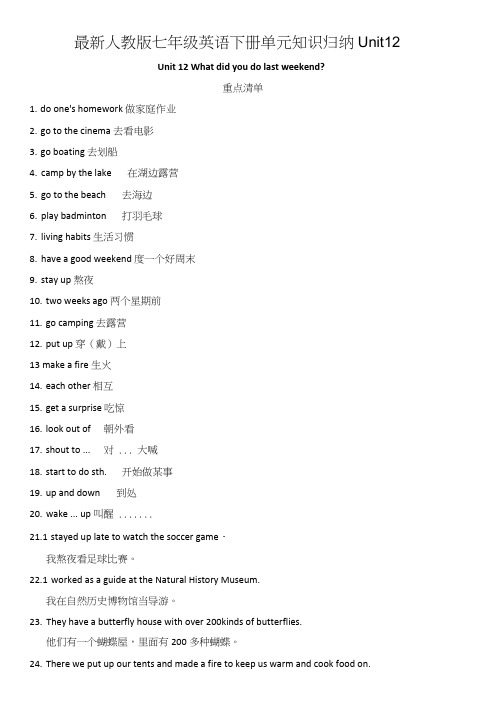
最新人教版七年级英语下册单元知识归纳Unit12Unit 12 What did you do last weekend?重点清单1.do one's homework 做家庭作业2.go to the cinema 去看电影3.go boating 去划船4.camp by the lake 在湖边露营5.go to the beach 去海边6.play badminton 打羽毛球7.living habits 生活习惯8.have a good weekend 度一个好周末9.stay up 熬夜10.two weeks ago 两个星期前11.go camping 去露营12.put up 穿(戴)上13 make a fire 生火14.each other 相互15.get a surprise 吃惊16.look out of 朝外看17.shout to ... 对 ... 大喊18.start to do sth. 开始做某事19.up and down 到处20.wake ... up 叫醒 .......21.1stayed up late to watch the soccer game・我熬夜看足球比赛。
22.1worked as a guide at the Natural History Museum.我在自然历史博物馆当导游。
23.They have a butterfly house with over 200kinds of butterflies.他们有一个蝴蝶屋,里面有200多种蝴蝶。
24.There we put up our tents and made a fire to keep us warm and cook food on.在那我们支起一个帐篷,并生火取暖,在火上烹饪食物。
25.1was so tired that I went to sleep early.我太累了,因此很早就去睡觉了。
人教版英语七年级下册Unit12SectionA(1a2c)教学设计
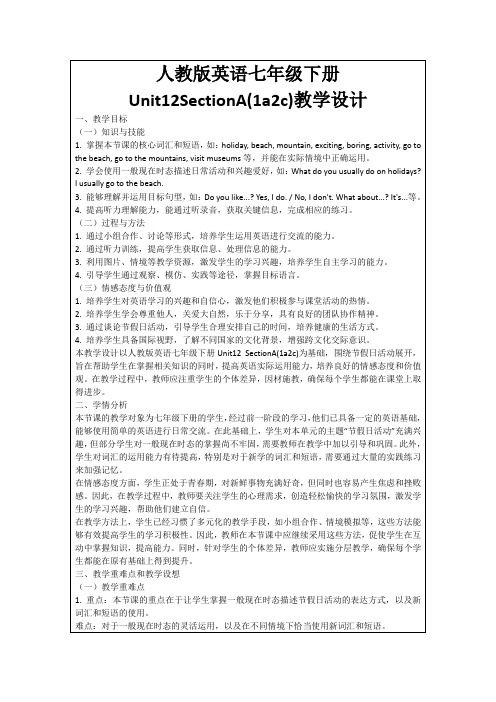
4.引导学生观察图片并回答问题,教师揭示本节课的主题:“Yes, today we are going to learn about holidays and activities.”
(三)学生小组讨论
1.教师将学生分成小组,每组讨论以下问题:“What do you like to do on holidays? Why?”
2.学生在小组内分享自己的观点,使用一般现在时态进行表达,如:“I like to go to the mountains because it's quiet and beautiful.”
3.教师巡回指导,关注学生的讨论过程,及时给予帮助和鼓励。
4.每个小组选取一名代表,向全班汇报讨论成果,其他小组成员认真倾听并给予评价。
5.教师对学生的讨论进行点评,强调重点语法和词汇的运用。
(四)课堂练习
1.教师呈现2a部分的练习,要求学生根据听力材料,完成相应的任务。
2.学生独立完成练习,提高听力理解能力。
b.制作一张关于节假日活动的手抄报,用英文展示所学知识,提高学生的动手能力和审美意识。
作业要求:
1.学生应在课后认真完成作业,注意书写规范,保证作业质量。
2.家长要关注学生的学习情况,协助学生完成口语作业,并及时给予反馈。
3.教师在批改作业时,要关注学生的错误类型,给予针对性的指导和建议。
4.鼓励学生在完成作业的过程中,积极思考、主动探索,提高自主学习能力。
人教版英语七年级下册Unit12SectionA(1a2c)教学设计
人教版初中英语七年级下册Unit12SectionA教材全解

人教版初中英语七年级下册Unit12SectionA教材全解Unit 12 What did you do last weekend?Unit 12 Section A教材全解1.go boating去划船【重点注释】这是“go+doing”结构的短语,类似的还有:go swimming/fishing/shopping/skating/camping去游泳/钓鱼/购物/滑冰/野营。
2.camped by the lake在湖边野营【重点注释】①camp此处作不及物动词,意为“扎营,宿营”,常用短语go camping意为“去野营”,camp out意为“野营;露营”。
例如:We camped near the beach.我们靠近海滩宿营。
Where did you camp last night?昨晚你在哪里宿营了?They often go camping on summer holidays.他们经常在暑假去野营。
I went camping with my friends last Sunday.上星期日我和朋友们去露营了。
The students love camping out on summer holidays.学生们喜欢在暑假中露营。
【拓展记忆】camp还可作名词,意为“野营,营地“,可构成词组:summer camp夏令营,winter camp冬令营。
例句:Let’s go back to the camp.It’s getting dark.我们回营地吧。
天快黑了。
We had a good week at the camp.我们在营地过了愉快的一周。
Did you go to summer camp last year?去年你参加夏令营了吗?②by the lake在湖边,by此处是介词,意为“在……旁边”、“在……近旁”、“在……手边”,此时要注意它与介词near有所不同,即by表示的距离更“近”。
人教版初中英语七年级下册Unit12SectionB教材全解
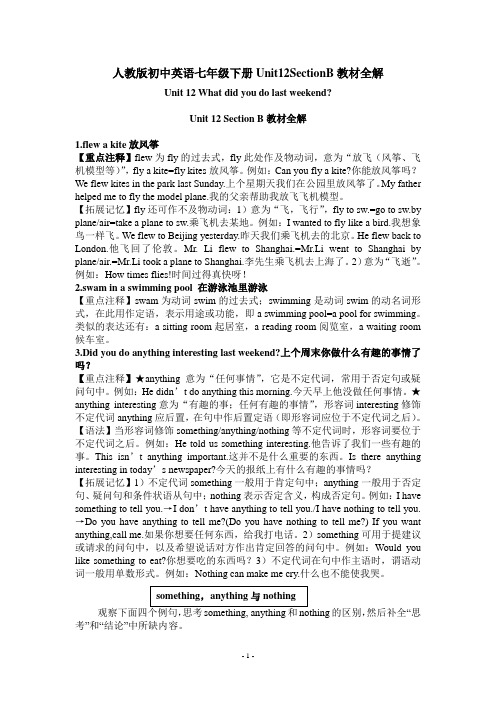
人教版初中英语七年级下册Unit12SectionB教材全解Unit 12 What did you do last weekend?Unit 12 Section B教材全解1.flew a kite放风筝【重点注释】flew为fly的过去式,fly此处作及物动词,意为“放飞(风筝、飞机模型等)”,fly a kite=fly kites放风筝。
例如:Can you fly a kite?你能放风筝吗?We flew kites in the park last Sunday.上个星期天我们在公园里放风筝了。
My father helped me to fly the model plane.我的父亲帮助我放飞飞机模型。
【拓展记忆】fly还可作不及物动词:1)意为“飞,飞行”,fly to sw.=go to sw.by plane/air=take a plane to sw.乘飞机去某地。
例如:I wanted to fly like a bird.我想象鸟一样飞。
We flew to Beijing yesterday.昨天我们乘飞机去的北京。
He flew back to London.他飞回了伦敦。
Mr. Li flew to Shanghai.=Mr.Li went to Shanghai by plane/air.=Mr.Li took a plane to Shanghai.李先生乘飞机去上海了。
2)意为“飞逝”。
例如:How times flies!时间过得真快呀!2.swam in a swimming pool 在游泳池里游泳【重点注释】swam为动词swim的过去式;swimming是动词swim的动名词形式,在此用作定语,表示用途或功能,即a swimming pool=a pool for swimming。
类似的表达还有:a sitting room起居室,a reading room阅览室,a waiting room 候车室。
人教版英语七年级下册 Unit 12 waht did you do last weekend 语法解析

On the first night, we just sat under the moon and told each other stories. But I was so tired that I went to sleep early. On the first night, … 在头一天夜里,…… 英语中表示一天中的时间分别采用at night (在夜里)、in the morning (在上午)、in the evening (在下午)等,但表示 “在某一天上午、下午或晚上等”的特定时间,往往使 用介词on。(只要是在某一天,不管哪个时辰,都用on On the morning of November 20th, we got a special postcard. 在11月20号早上,我们收到了一张特殊的明信片。 But I was so tired that I went to sleep early. 但是我太累了,所以早早就睡着了。 “so +形容词+that 从句”,表示“太……以至于……”。 The game is so interesting that I don’t want to stop playing it. 这个游戏是如此有意思,以至于我都不想停下来。 The soup was so delicious that he drank it up. 汤是那么好喝,于是他喝了个精光。
bring从远处把某物拿到跟前;take…(with)随身带上 某物,即物就在旁,强调的是“去、 回”双线行为。
We went camping in a small village in India. First, we took a long bus ride to a lake in the countryside. There we put up our tents and made a fire to keep us warm and cook food on.
最新人教版七年级英语下册教案 unit12 第1课时 教案
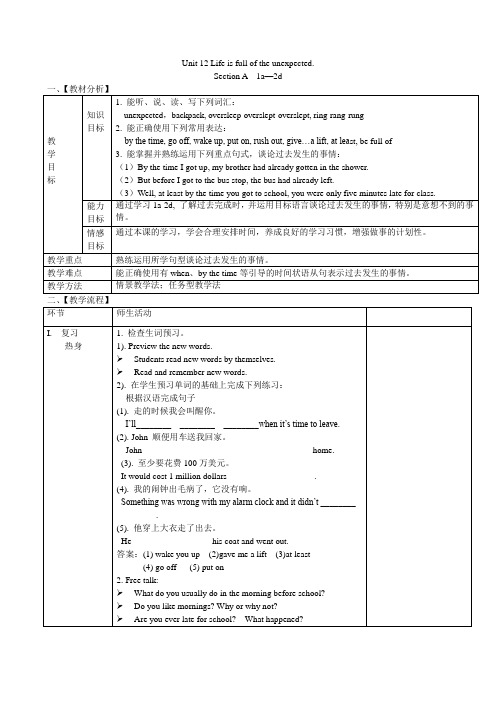
How did Kevin get to school?
2). Listen again and fill in the chart.
Alarm
clock
Time to
wake up
So
The bus
How to
get to school
8:00
After checking the answers, ask students to read the sentences carefully, and then tell the structure of past perfect tense: “had+过去分词”.
过去完成时用法:
(1)构成:由助动词had(用于各种人称和数)+过去分词”构成
2)use the bathroom but someone in it
3)catch the bus
4)had just left
5)get to school, realize …had left …
Give students some time to prepare. Then ask some students to describe the pictures.
教学重点
熟练运用所学句型谈论过去发生的事情。
教等引导的时间状语从句表示过去发生的事情。
教学方法
情景教学法;任务型教学法
二、【教学流程】
环节
师生活动
I.复习
热身
1.检查生词预习。
1). Preview the new words.
Students read new words by themselves.
人教版七年级英语下册Unit12Whatdidyoudolastweekend教学设计

-教授动词过去式变化规则,并通过练习进行巩固。
2.教学目的:
-帮助学生掌握一般过去时态的语法结构,理解其用法。
-让学生学会动词过去式的变化规律,为实际运用打下基础。
(三)学生小组讨论
1.教学活动设计:
-教师将学生分成小组,每组选择一个周末活动的话题,如:go shopping,go to the movies,play soccer等。
四、教学内容与过程
(一)导入新课
1.教学活动设计:
-教师以提问方式引导学生回顾上一单元的主题,如:“Can you remember what we talked about last unit? What activities do you like to do in your free time?”
二、学情分析
针对人教版七年级英语下册Unit 12 "What did you do last weekend?",学生在之前的学习中已经掌握了基本的英语语法和词汇,能够运用一般现在时态描述日常生活。在此基础上,他们对于一般过去时态的掌握处于初步阶段,需要在本章节的学习中进行巩固和提高。
七年级的学生正处于青春期,好奇心强,喜欢分享自己的经历和见闻。因此,在本章节的教学中,教师应充分利用学生的这一特点,引导他们用英语表达过去发生的活动,激发学生的学习兴趣和表达欲望。
人教版七年级英语下册Unit12Whatdidyoudolastweekend教学设计
一、教学目标
(一)知识与技能
1.学生能够掌握并熟练运用一般过去时态描述过去发生的事情,如:“I went to the park last weekend.”。
人教版初中七年级英语下册第十二单元Unit12教案含教学反思

⼈教版初中七年级英语下册第⼗⼆单元Unit12教案含教学反思第11单元How was your school trip?类别课程标准要求掌握的内容话题School trips 学校旅游Section A 单词milk v.挤奶cow n.奶⽜horse n.马feed v.喂养;饲养farmer n.农民;农场主quite adv.相当;完全anything pron.任何东西;任何事物grow v.种植;⽣长;发育farm n.农场v.务农;种⽥pick v.采;摘excellent adj.极好的; 优秀的countryside n.乡村;农村yesterday adv.昨天flower n.花worry v.& n.担⼼;担忧luckily adv.幸运地;好运地sun n.太阳短语milk a cow给奶⽜挤奶ride a horse 骑马feed chickens 喂鸡quite a lot (of…)许多in the countryside 在乡下;在农村show sb. around…带领某⼈参观……last week上个星期go fishing 去钓鱼句型1.—How was your school trip?你的学校郊游怎么样?—It was great! 好极了!2.—Did you go to the zoo?你去动物园了吗?语法⼀般过去时(⼀)写作介绍过去的活动知识⽬标⼀般过去时态(I)能⼒⽬标能⼒⽬标能够听懂⽤⼀般过去时表达的句⼦;能够和别⼈谈论过去发⽣的事情,正确使⽤⼀般过去时;能够读懂含有⼀般过去时的句⼦的⽂章;学会使⽤⼀般过去时进⾏简单的写作。
情感⽬标能够谈论⾃⼰的郊游经历,感受⽣活的乐趣。
【课时建议】本单元建议5课时Section A (1a~2d)………………………………………………………………………………………1课时Section A (3a~3b)……………………………………………………………………………………1课时Section B (1a~1d)……………………………………………………………………………………1课时Section B (2a~2c)……………………………………………………………………………………1课时Section B (3a~3c)……………………………………………………………………………………1课时词汇短语:主要采⽤图⽚及多媒体展⽰助记法。
最全面人教版七年级下册英语第十二单元知识点归纳总结
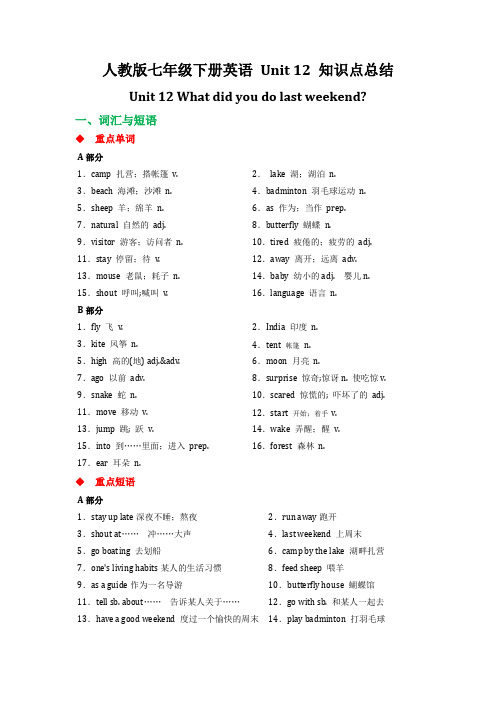
人教版七年级下册英语Unit 12 知识点总结Unit 12 What did you do last weekend? 一、词汇与短语◆重点单词A部分1.camp 扎营;搭帐篷v.2.lake 湖;湖泊n.3.beach 海滩;沙滩n.4.badminton 羽毛球运动n. 5.sheep 羊;绵羊n.6.as 作为;当作prep. 7.natural 自然的adj.8.butterfly 蝴蝶n.9.visitor 游客;访问者n.10.tired 疲倦的;疲劳的adj. 11.stay 停留;待v.12.away 离开;远离adv. 13.mouse 老鼠;耗子n.14.baby 幼小的adj. 婴儿n. 15.shout 呼叫;喊叫v.16.language 语言n.B部分1.fly 飞v.2.India 印度n.3.kite 风筝n.4.tent 帐篷n.5.high 高的(地) adj.&adv.6.moon 月亮n.7.ago 以前adv.8.surprise 惊奇;惊讶n. 使吃惊v. 9.snake 蛇n.10.scared 惊慌的; 吓坏了的adj. 11.move 移动v.12.start 开始;着手v.13.jump 跳; 跃v.14.wake 弄醒;醒v.15.into 到……里面;进入prep.16.forest 森林n.17.ear 耳朵n.◆重点短语A部分1.stay up late深夜不睡;熬夜2.run away跑开3.shout at……冲……大声4.last weekend 上周末5.go boating 去划船6.camp by the lake 湖畔扎营7.one's living habits某人的生活习惯8.feed sheep 喂羊9.as a guide作为一名导游10.butterfly house 蝴蝶馆11.tell sb. about……告诉某人关于……12.go with sb. 和某人一起去13.have a good weekend 度过一个愉快的周末14.play badminton 打羽毛球B部分1.fly a kite 放风筝2.high school 中学3.put up 搭起;举起4.each other 互相;彼此5.get a surprise 吃惊6.shout to……对……大声喊叫7.up and down 上上下下;起伏8.wake……up 把……弄醒9.a special gift 一件特殊的礼物10.take a long bus ride to 乘长途车去11.put up 搭起;举起12.keep sb. warm 使某人暖和13.on the first night 在第一个夜晚14.tell a story 讲故事15.go to sleep 入睡,睡着16.look out of 朝外看17.read a book about…读关于…的书18.know about 知道关于19.start to do sth. 开始做某事20.jump up and down 跳上跳下21.move into 搬进22.make a fire 生火23.something interesting 有趣的事情24.feel……doing sth. 觉得……正在做某事25.finish high school 高中毕业26.see……doing sth. 看见……正在做某事27.clean one's room 打扫房间28.so……that……如此……以至于……29.on Saturday night 在周六晚上30.have dinner with sb.和某人一起吃晚饭31.stay at home 待在家里32.have a busy weekend度过一个繁忙的周末33.talk show 脱口秀34.study for……为……学习◆重点句子A部分1.—What did you do last weekend? 上个周末你做什么了?—I did my homework. 我做我的家庭作业了。
人教版七年级下册英语Unit12单元语法知识点总结

人教版七年级下册英语Unit12单元语法知识点总结本单元重点短语的具体用法1. Last weekend:用于描述过去的时间,通常在句子中作时间状语。
例如:I went shopping last weekend.(我上周末去购物了。
)2. Do one's homework:表示做作业。
例如:I need to do my homework before going out.(我需要在出去之前做作业。
)3. Go to the cinema:去看电影。
例如:They decided to go to the cinema instead of staying at home.(他们决定去电影院而不是待在家里。
)4. Go boating:去划船。
例如:We went boating on the lake and had a great time.(我们在湖上划船,玩得很开心。
)5. Camp by the lake:在湖边露营。
例如:They camped by the lake and enjoyed the beautiful scenery.(他们在湖边露营,欣赏美丽的风景。
)6. Go to the beach:去海滩。
例如:I like to go to the beach to relax.(我喜欢去海滩放松。
)7. Play badminton:打羽毛球。
例如:They played badminton in the park.(他们在公园里打羽毛球。
)8. On Saturday morning:在周六的早上。
例如:On Saturday morning, I usually sleep in.(在周六的早上,我通常会睡懒觉。
)9. Study for the English test:为英语考试学习。
例如:I have to study for the English test tomorrow.(我必须为明天的英语考试学习。
人教版七年级下册英语Unit 12 教学设计
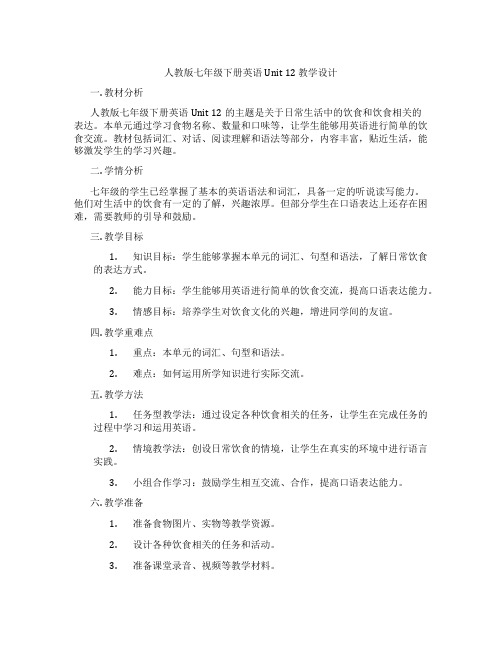
人教版七年级下册英语Unit 12 教学设计一. 教材分析人教版七年级下册英语Unit 12的主题是关于日常生活中的饮食和饮食相关的表达。
本单元通过学习食物名称、数量和口味等,让学生能够用英语进行简单的饮食交流。
教材包括词汇、对话、阅读理解和语法等部分,内容丰富,贴近生活,能够激发学生的学习兴趣。
二. 学情分析七年级的学生已经掌握了基本的英语语法和词汇,具备一定的听说读写能力。
他们对生活中的饮食有一定的了解,兴趣浓厚。
但部分学生在口语表达上还存在困难,需要教师的引导和鼓励。
三. 教学目标1.知识目标:学生能够掌握本单元的词汇、句型和语法,了解日常饮食的表达方式。
2.能力目标:学生能够用英语进行简单的饮食交流,提高口语表达能力。
3.情感目标:培养学生对饮食文化的兴趣,增进同学间的友谊。
四. 教学重难点1.重点:本单元的词汇、句型和语法。
2.难点:如何运用所学知识进行实际交流。
五. 教学方法1.任务型教学法:通过设定各种饮食相关的任务,让学生在完成任务的过程中学习和运用英语。
2.情境教学法:创设日常饮食的情境,让学生在真实的环境中进行语言实践。
3.小组合作学习:鼓励学生相互交流、合作,提高口语表达能力。
六. 教学准备1.准备食物图片、实物等教学资源。
2.设计各种饮食相关的任务和活动。
3.准备课堂录音、视频等教学材料。
七. 教学过程1.导入(5分钟)利用图片或实物展示各种食物,引导学生谈论他们喜欢吃的食物。
2.呈现(10分钟)介绍本课的主题,展示食物图片,引导学生用英语描述食物。
3.操练(15分钟)分组进行角色扮演,模拟餐厅点餐的场景,练习本课的句型和词汇。
4.巩固(10分钟)学生互相提问,用英语讨论喜欢的食物和口味。
教师给予指导和反馈。
5.拓展(10分钟)听录音或观看视频,了解不同地区的饮食习惯。
学生分享自己的饮食文化。
6.小结(5分钟)总结本节课所学内容,强调日常饮食的表达方式。
7.家庭作业(5分钟)布置作业:用英语写一篇关于自己喜欢的食物的短文。
人教版七年级下册英语Unit12说课稿
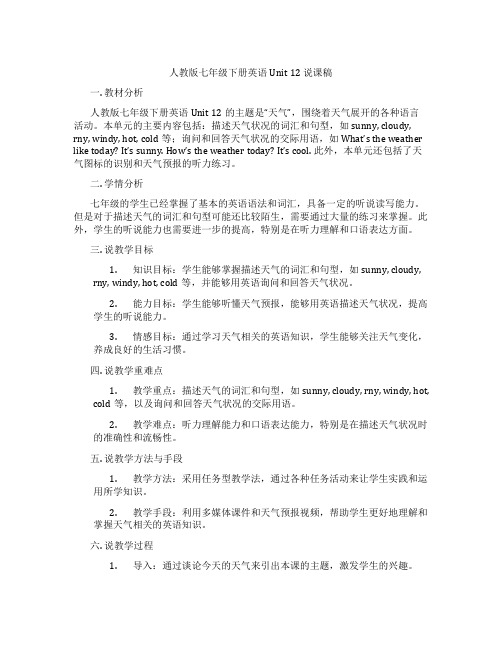
人教版七年级下册英语Unit 12 说课稿一. 教材分析人教版七年级下册英语Unit 12的主题是“天气”,围绕着天气展开的各种语言活动。
本单元的主要内容包括:描述天气状况的词汇和句型,如sunny, cloudy, rny, windy, hot, cold等;询问和回答天气状况的交际用语,如What’s the weather like today? It’s sunny. How’s the weather today? It’s cool. 此外,本单元还包括了天气图标的识别和天气预报的听力练习。
二. 学情分析七年级的学生已经掌握了基本的英语语法和词汇,具备一定的听说读写能力。
但是对于描述天气的词汇和句型可能还比较陌生,需要通过大量的练习来掌握。
此外,学生的听说能力也需要进一步的提高,特别是在听力理解和口语表达方面。
三. 说教学目标1.知识目标:学生能够掌握描述天气的词汇和句型,如sunny, cloudy,rny, windy, hot, cold等,并能够用英语询问和回答天气状况。
2.能力目标:学生能够听懂天气预报,能够用英语描述天气状况,提高学生的听说能力。
3.情感目标:通过学习天气相关的英语知识,学生能够关注天气变化,养成良好的生活习惯。
四. 说教学重难点1.教学重点:描述天气的词汇和句型,如sunny, cloudy, rny, windy, hot,cold等,以及询问和回答天气状况的交际用语。
2.教学难点:听力理解能力和口语表达能力,特别是在描述天气状况时的准确性和流畅性。
五. 说教学方法与手段1.教学方法:采用任务型教学法,通过各种任务活动来让学生实践和运用所学知识。
2.教学手段:利用多媒体课件和天气预报视频,帮助学生更好地理解和掌握天气相关的英语知识。
六. 说教学过程1.导入:通过谈论今天的天气来引出本课的主题,激发学生的兴趣。
2.新课呈现:介绍描述天气的词汇和句型,如sunny, cloudy, rny,windy, hot, cold等,并通过示例来展示如何用英语询问和回答天气状况。
人教版PEP英语七年级下册 Unit 12 单元分析

played badminton, went to the beach,
went to the cinema, camped by the lake。4. 对话里呈现了一般过去时 的问答和常见的规则和不规则动词 的过去式,但规则动词变形居多。 Section A 2a-2b: 1.发生在课堂的对 话,对话里出现了一些常见的教师 反馈或鼓励用语,如Good, Great, good for you。2. 对话里出现的人物
单元课时划分
课时 Period 1 Period 2 Period 3 Period 4
课型
Listening and speaking Reading+Grammar Reading Writing
课时教学内容
Section A 1a-2c+Section B 1a-1e Section A 2d+GF-3c
用五句话描述你的上一个周末。
选择一:跟你的同伴复述Lisa的故事 选择二:你有值得纪念的周末吗?写一篇小短文来分 享你的经历
丰富写作并与同伴分享,同伴按照语法、语言、逻辑 三个层面给出评价。
都干了什么。
受到周末生活的
Section A 2a-2b: 老师 美好
和Becky, Carol, Jack之
间的对话。老师分别
询问他们三人周末干
了什么,三人一一回
答。
How
Section A 1a-1b: 1.这是一个发生在 同学之间的对话,对话的语气轻松 随意,所以对话里会出现一些比较 生活化的语气词和连词,如Hi, So, Cool, Well。2.对话的逻辑结构非常 清晰,Lucy在介绍周末经历的时候 有非常明显的时间状语,如on
初中英语人教版七年级下册Unit 12 知识点(重点单词+短语+句子精讲)

七年级英语下册Unit 12知识点【重点单词】camp v.扎营;扎帐篷lake n.湖,湖泊beach n.海滩,沙滩badminton n.羽毛球运动sheep n.羊,绵羊as adv.&pron.作为,当做natural pron.自然的butterfly n.蝴蝶visitor n.游客;访问者tired adj.疲倦的stay v.停留stay up late深夜不留away adv.离开run away 跑开mouse n.老鼠baby n.幼小的shout v.呼叫,喊叫shout at…冲……大声叫嚷woof v.(狗叫声)汪汪language n.语言fiy v.飞kite n.风筝fiy a kite 放风筝high adj.&adv高的(地)high school中学ago adv.以前India n.印度tent n.帐篷put up 搭起,举起moon n.月亮surprise n.&v.惊奇,惊讶get a surpris 吃惊snake n.蛇scared adj.惊慌的move v.移动shout to…对……大声喊叫start v.开始,着手jump v.跳跃up and down 上上下下wake v.弄醒,醒into prep.到……里面forest n.森林ear n.耳朵【重点短语】st weekend 上周末2.do one’s homework 做作业3.go to the cinema 看电影4.go boating 去划船5.camp by the lake 在湖边露营6.go to the beach 去海滩7.play badminton 打羽毛球8.on Saturday morning 在周六的早上9.study for the English test 为了英语考试学习10.feed some cows 喂一些奶牛11.work as a guide 做为一个导游工作12.Natural History Museum 自然历史博物馆13.butterfly house 蝴蝶馆14.over 200 kinds of butterflies 超过200多种蝴蝶15.tell sb about …告诉某人关于…16.living habits 生活习惯17.be kind of tired 有点儿累19.stay up 熬夜20.play with sb.和某人玩21.lose things 丢东西22.run away 跑开23.fly a kite 放风筝24.as a special gift 作为一个特殊的礼物25.take sb.to sp.把某人带到某地26.go camping 去露营27.put up the tents 搭建帐篷28.make a fire 生火29.keep sb.warm 使某人保持温暖30.on the first night 在第一天晚上31.so...that...如此…以至于…32.go to sleep 去睡觉33.get a surprise 吃惊34.see sb.doing sth.看见某人正在做某事35.jump up and down 上蹦下跳36.climb onto one’s back 爬到某人背上37.shout at/shout to 大声喊叫38 wake …up 把...弄醒39.move into…移入,爬进…中40.a useful lesson 有用的一课【重点句型】1.—What did you do last weekend?Lucy?Lucy,你上周末做了什么?—Well, on Saturday, I played badminton.噢.周六我打羽毛球了。
人教版七年级下册英语Unit 12 知识点语法归纳总结
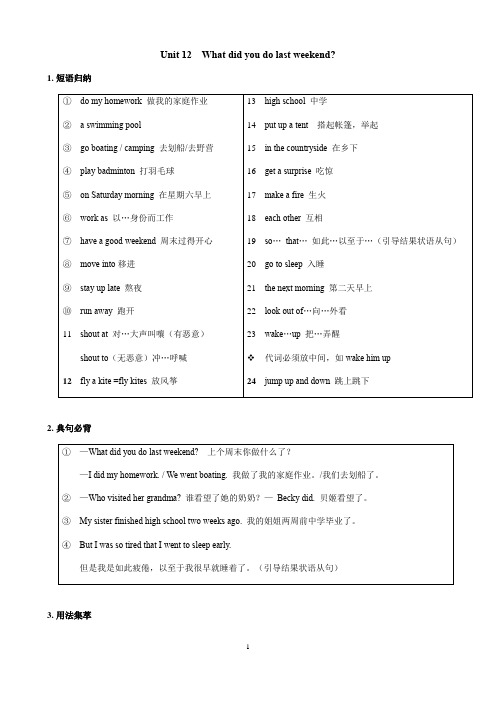
Unit 12 What did you do last weekend?1.短语归纳2.典句必背3.用法集萃(1)What did you do last weekend? 你上周末做了什么?❖last 作形容词时,意为“最后的,最末的”或者“紧接前面的,刚过去的”。
例如:Today is the last day in the year. 今天是今年的最后一天。
I didn’t sleep well last night. 昨晚我没睡好。
❖last作副词时,意为“最后地”,例如:I’m the last one. 我是最后一个。
❖last 做动词时,意思是“持续,继续,维持”等,例如:The hot weather lasted a week. 炎热的天气持续了一周。
(2)How interesting! 多有趣啊!❖本句是how引导的感叹句,how用来修饰形容词或副词,此类感叹句的结构为:“How+形容词/副词( +主语+谓语)!”。
例:How beautiful the girl is! 这个女孩真漂亮啊!How fast the boy is running ! 那个男孩跑得真快啊!❖what也可以引导感叹句,what用来修饰名词。
常见的结构有:(3)I stayed up late to watch the soccer game. 我熬夜到很晚看了足球赛。
❖stay up是固定搭配,意为“熬夜”。
例:She stayed up until 2 :00 am. 她熬夜熬到凌晨两点。
❖常见的“动词+up”结构的短语还有:(4)The cat quickly ran away. 那只猫飞快地逃跑了。
❖run away意为“逃跑;跑开”,其中run意为“跑”,过去式是ran,属于不规则变化。
例:The thief tried to run away, but he failed. 那个小偷试图逃跑,但失败了。
- 1、下载文档前请自行甄别文档内容的完整性,平台不提供额外的编辑、内容补充、找答案等附加服务。
- 2、"仅部分预览"的文档,不可在线预览部分如存在完整性等问题,可反馈申请退款(可完整预览的文档不适用该条件!)。
- 3、如文档侵犯您的权益,请联系客服反馈,我们会尽快为您处理(人工客服工作时间:9:00-18:30)。
Unit 12 What did you do last weekend?单元整体分析◆重点词句梳理单词卡片 名词: lake, beach, badminton, sheep, butterfly, visitor, mouse (pl. mice), baby, language动词: camp, stay, shout形容词: natural, tired, baby副词: as, away 介词: as象声词: woof短语归纳动词短语: stay up late, run away, shout at句型再现 1. What did you do last weekend? 2. On Saturday morning, I played badminton. 3. How was your weekend? 4. Did you have a good weekend ? 5. It was good, but I'm kind of tired now.6. I stayed up late to watch the soccer game.7. I had so much fun!8. Sounds fun!9. How interesting!10. The weather was beautiful, so I went to the beach with my friends.11. That's why it's important to learn a second language.单词卡片 名词:kite, India, tent, moon, surprise, snake, forest, ear动词:surprise, move, start, jump, wake形容词:high, scared副词: high, ago 介词:into短语归纳 名词短语: high school动词短语:fly a kite, put up, get a surprise, shout to, wake …up副词短语: up and down句型再现 1. As a special gift, our parents took us to India.2. I was so tired that I went to sleep early.3. What an interesting job they have !4. When we looked out of our tent, we saw a big snake sleeping near the fire.◆教材内容解读本单元以“周末活动”为话题,用一般过去时态谈论如何度过上周末的。
Section A 用“What did you do last weekend?”引出“谈论周末活动”的话题,同时复习一些表示周末活动的动词短语,如:Section ASection Bcamp by the lake, go to the beach, play badminton, study for the test, visit my grandparents等。
Section B 部分呈现了更多的周末活动词汇和更多的不规则动词的过去式。
本部分通过阅读Jim 和Sally周末活动的文章,巩固本单元语言知识,增长知识,开拓视野。
◆功能话题应用How was your weekend?It was great.What did you do last weekend?I played soccer.Who did you play with?I played with my friend.◆语法结构点击实义动词的一般过去时态背景知识链接◆采用P242话题相关链接。
Section A新课备课素材◆素材一新课导入设计导入一图片导入:show some pictures about doing homework, going boating, playing badminton ...; show the new words and expressions with the pictures; then lead to the new lesson.导入二情境导入:Let students do some actions,like doing homework, going boating, playing badminton and so on; Other Ss guess the actions. Then lead to the new lesson导入三Free talking:采用新教案P243话题导入导语一。
◆素材二新课活动案例活动 1 采用新教案P243活动设计活动 2 Role-play(分角色表演,强化巩固关于上周末活动为话题的情景对话。
)Step 1 Teacher shows some key words and phrases; Ss use them to make their own conversations with partners.last weekend Saturday morning Sunday afternoon went boating camped by the lakeStep 2学生自己提供有关人物、地点、事件,让其他小组进行现场对话练习。
活动 3 “ One by one”Game分组进行,哪组表达最迅速,最流畅,耗时最少为获胜者。
(教师用秒表计时)S1: What did you do last weekend, Lucy?S2: I went to the cinema. What did you do last weekend, Mike?S3:I helped my mom with housework. What did you do last weekend, Tina?.........◆素材三听说强化训练采用P243 听说训练。
◆素材四语法突破建议:(一)【观察】Well, on Saturday morning, I played badminton.【探究】时间介词on: 用在具体的某一天前on Sunday/ Monday/ weekend 在星期天/星期一/周末on October 1st 在十月一日on a cold morning 在一个寒冷的早上【拓展】1. in+年/月/上午(下午、晚上)in 2015 在2015年in December 在12月份in the morning/ afternoon/ evening 在早上/下午/晚上2. at+时刻/中午(午夜)at ten o’clock 在十点钟at noon 在中午(二)【观察】--Who visited her grandma? -- Becky did.【探究】“Becky did.”相当于“Becky visited her grandma.” did 替代上文中提到的实义动词。
英语中的do, does 和did 常用来指代前面的动作或行为。
e.g. I don’t like beef noodles, but my mom does. 我不喜欢牛肉面,但我母亲喜欢。
(三)【观察】I worked as a guide at the Natural History Museum.【探究】“wok as+职业”意为“做某工作”e.g. He works in the hospital as a doctor. 他在那家医院当医生。
(四)【观察】How interesting!【探究】这是一个感叹句,句子结构为“How+形容词或副词(+主语+谓语)!”e.g. How exciting the movie is! 那部电影太有趣了!新课教学典案Section A Period1 (1a-1c)Step1. Warming-up and revision1.Show some pictures about doing homework, going boating, playing badminton ...; show the new words andexpressions with the pictures.2.反应游戏:把学生分成六组;从其中两组中各选一名成员,一人说动词原形一人说过去式或一人说过去式一人说动词原形;过去式和动词原形随机交换,看谁说得又对又快。
Step2. Presentation1 a Match the activities with the pictures [a-f].1. Read the phrases [1-6] and know about the meanings first.2. Look at the pictures and tell what the person did in each picture.3. Match the activities with the pictures [a-f].4. Check the answers.Step3. ListeningWork on 1bListen and write the day, morning, afternoon or night below each picture.1. Ask a student to explain the task and all Ss know what to do.2. Play the recording the first time. Students only listen. Play the recording a second time and fill theblanks.3. Check the answers.Step4. Pair workWork on 1c1. Role-play. Student A is Lucy. Student B asks Lucy about her weekend.B: What did you do last weekend, Lucy?A: Well, on Saturday morning, I played badminton.B: What did you do on Saturday afternoon?A: I went to the beach.…2.Ss practice with their partner first and then act out.Step5. Summary and Homework.Remember the activities in 1a.Section A Period 2 (2a-2d)Step 1. Warming-up and revision.1. Check the homework: Have a dictation about the activities in 1a.2. Let students do some actions,like doing homework, going boating, playing badminton and so on; Other Ss guess the actions.Step2. ListeningWork on 2a:1.Read the sentences first and understand the key words.2.Listen and underline the words you hear.3.Play the recording the first time. Students only listen.Play the recording a second time. This time, ask students to underline each word. Point out the sample answer, grandmother.4. Correct the answers.1grandma 2 homework 3 English 4 farm 5 cowsWork on 2b:1. Write C for Carol, B for B Becky or J for Jack next to each statement in activity 2a.2. Play the recording the first time. Students only listen.3. Point out the sample answer, S, in statement 1. Say, Sonia visited her grandmother.Play the recording again. Ask students to write a letter in front of each statement to show what each person did.4. Check the answers. B B C J JStep3. Pair workStudent A asks questions with who, what or where and Student B answers. Then change roles.A: Who visited her grandma?B: Becky did.A: Who stayed at home last weekend?B: Carol. I think.…Step4. Role-play the conversation.1.Learn the new words in 2d.2.Look at conversation in 2d. Then Ss read the dialogue by themselves and find the answer to thesequestions:①How was Lisa’s weekend?②Where did Lisa work as a guide?③What did Lisa do there?④What did Paul do on his weekend?Ss finish the questions themselves for eight minutes. Then ask Ss to check the answers.3. Ss work in pairs and role-play the conversations.4. Have several pairs perform their conversations for the rest of the class.Step5. Language points.1. I worked as a guide at the Natural History Museum.2. How interesting!3. They have a butterfly house with over 200 kinds of butterflies! (详见PPT)Step6. Summary and Homework:1. Remember the new words.2. Write about what you did last weekend.Section A Period 3 (Grammar Focus-3c)Step 1. Ⅰ. Warming- up and revision1.Check the homework: have a report about hat you did last weekend.2.Guess game: What did he/she do? (详见PPT)Step2. Grammar focus.1. Read the Grammar Focus. Translate the sentences into Chinese.2. Give Ss five minutes to remember the sentences.3. Review the Simple Past Tense and the rules of verbs in past simple tense4. 探究乐园:1、一般过去时态的特殊疑问句(1). 特殊疑问词+ was/were + 主语+ 其他?上个周末你过得怎么样?_______ _______ your last weekend?(2). 特殊疑问词+ did + 动词原形+ 主语+其他?昨天他做了什么事情?_____ ____ he do yesterday?Practice:Ask questions according to the above answers.(1). I did my homework last night.______ ______ you _______ last night?(2). I visited my grandparents last weekend._____ ______you visit last weekend?(3). They were in the park last Sunday.______ _______ they last Sunday?(4). My last weekend was interesting.______ _____ your last weekend?Ss do the exercise themselves. Check the answer together.Step3. PracticeWork on 3a1. Look at 3a. Fill in the blanks with who, what, where or how. Make the students finish the sentences bythemselves.2. Check the answers.。
